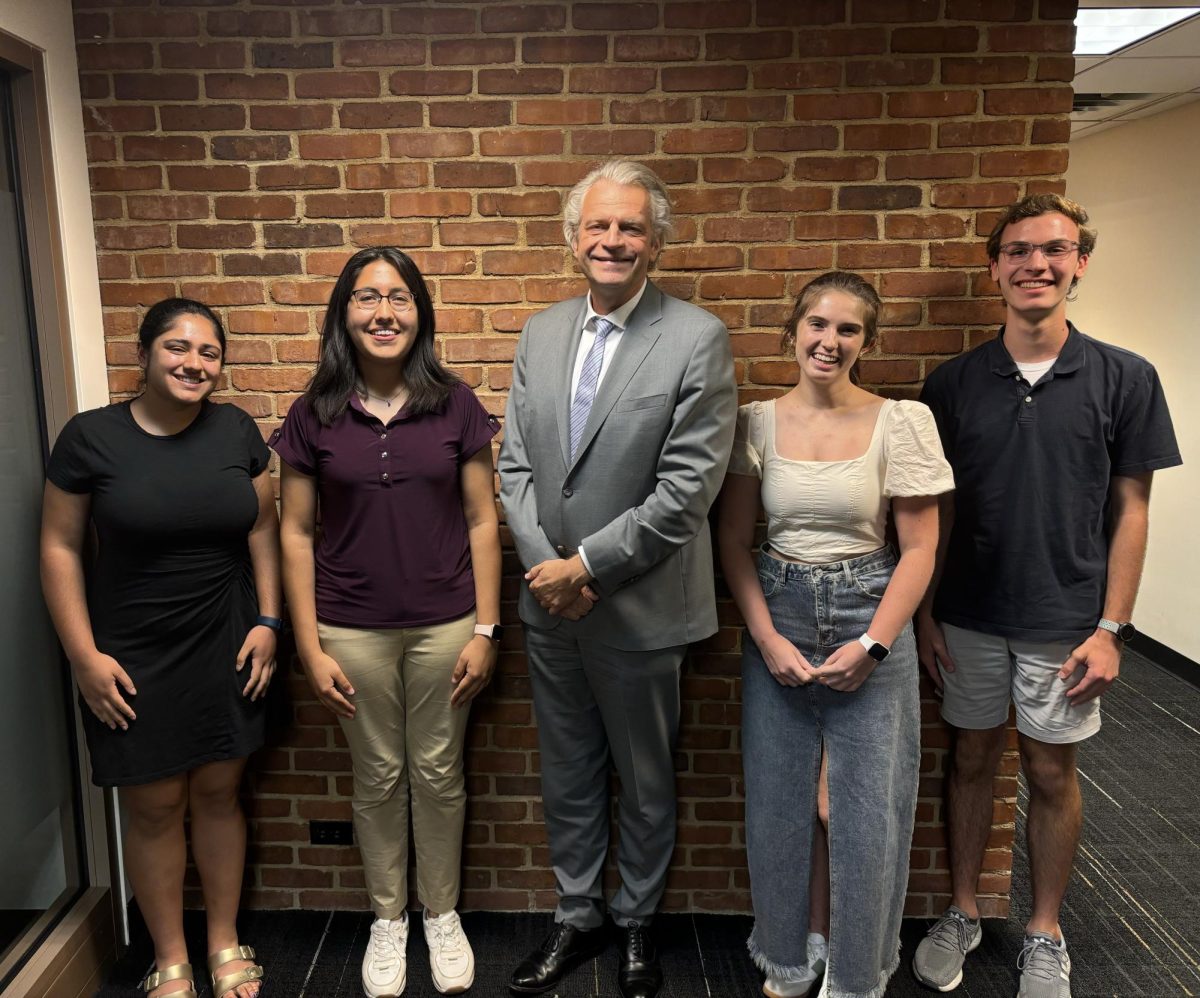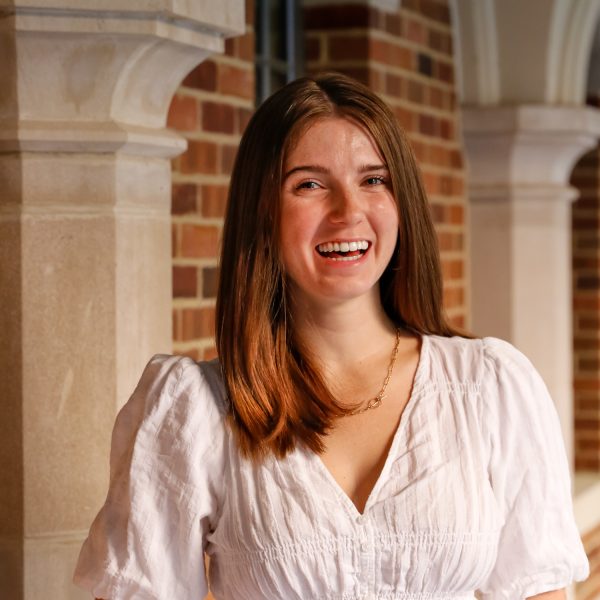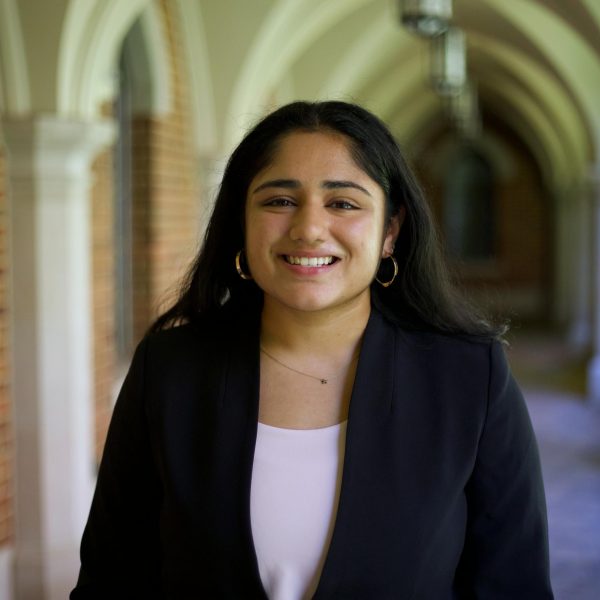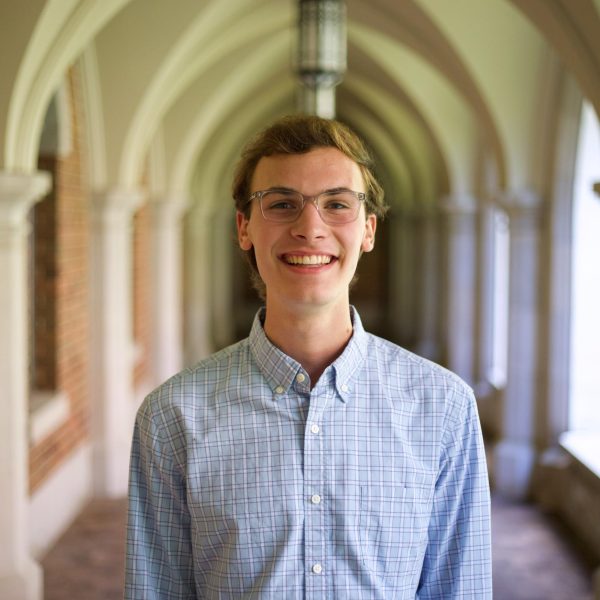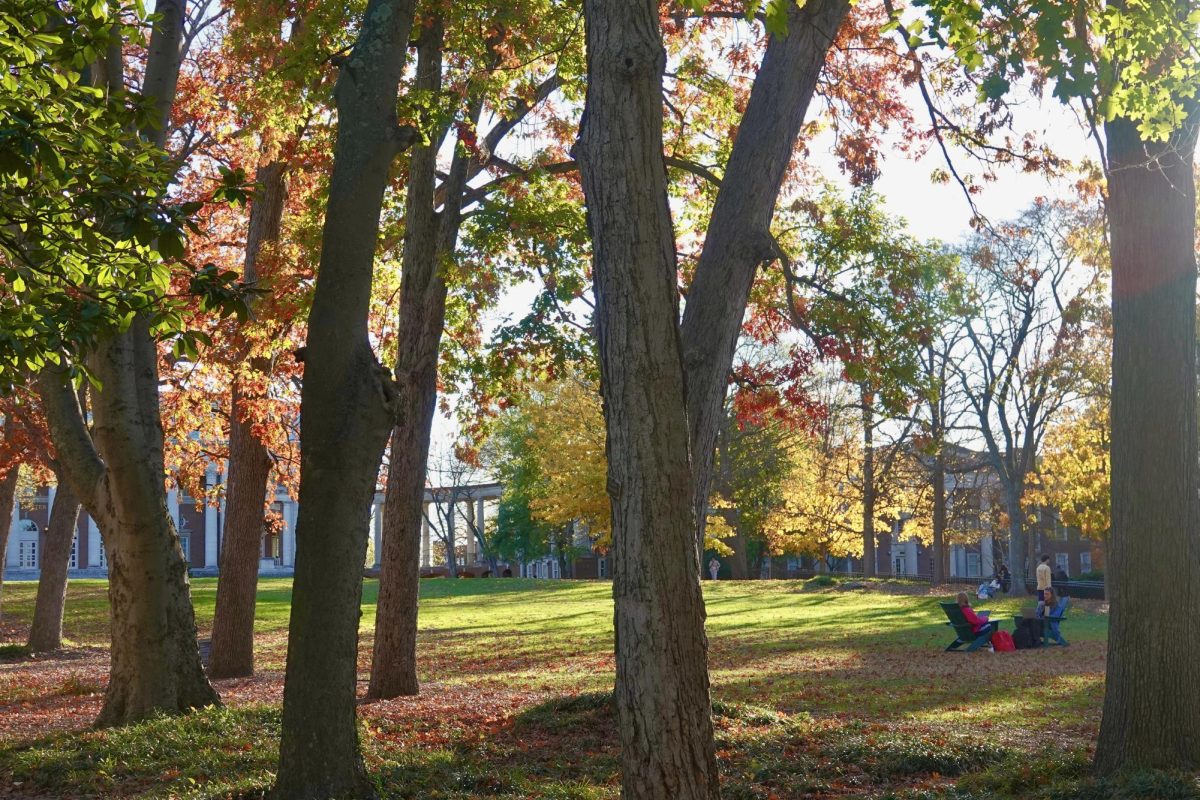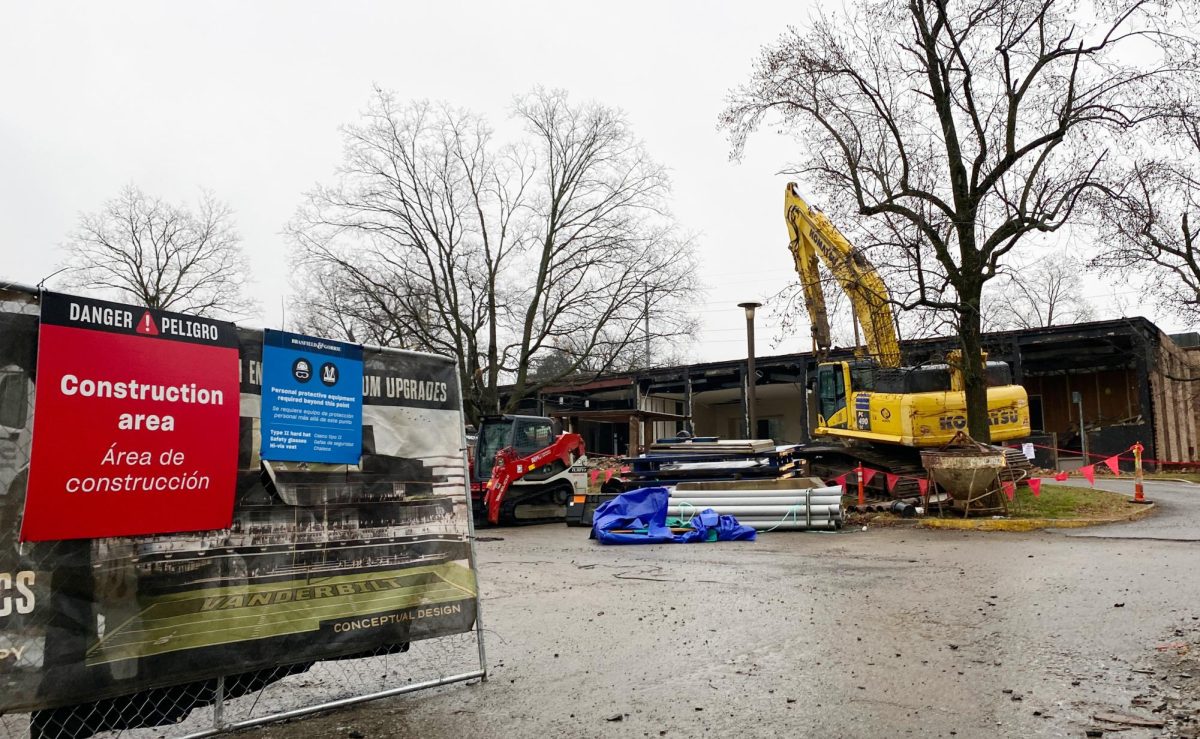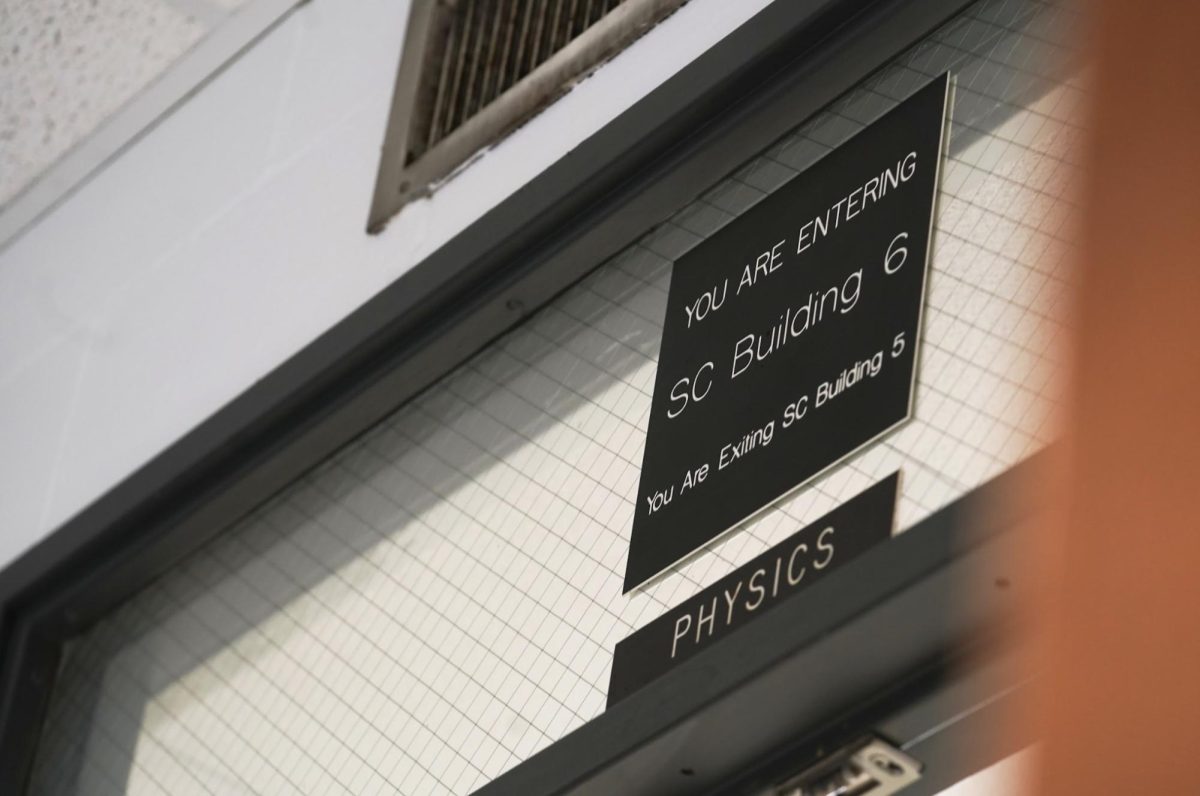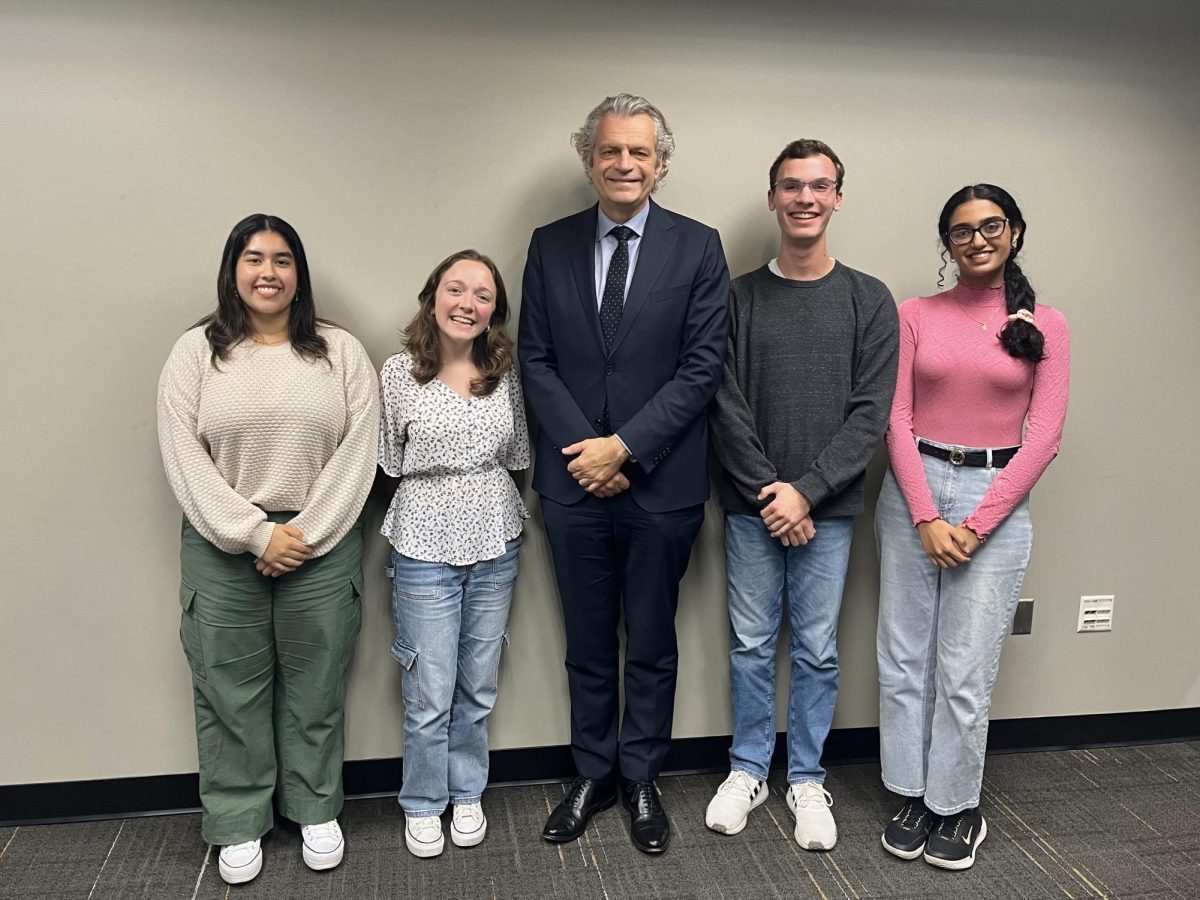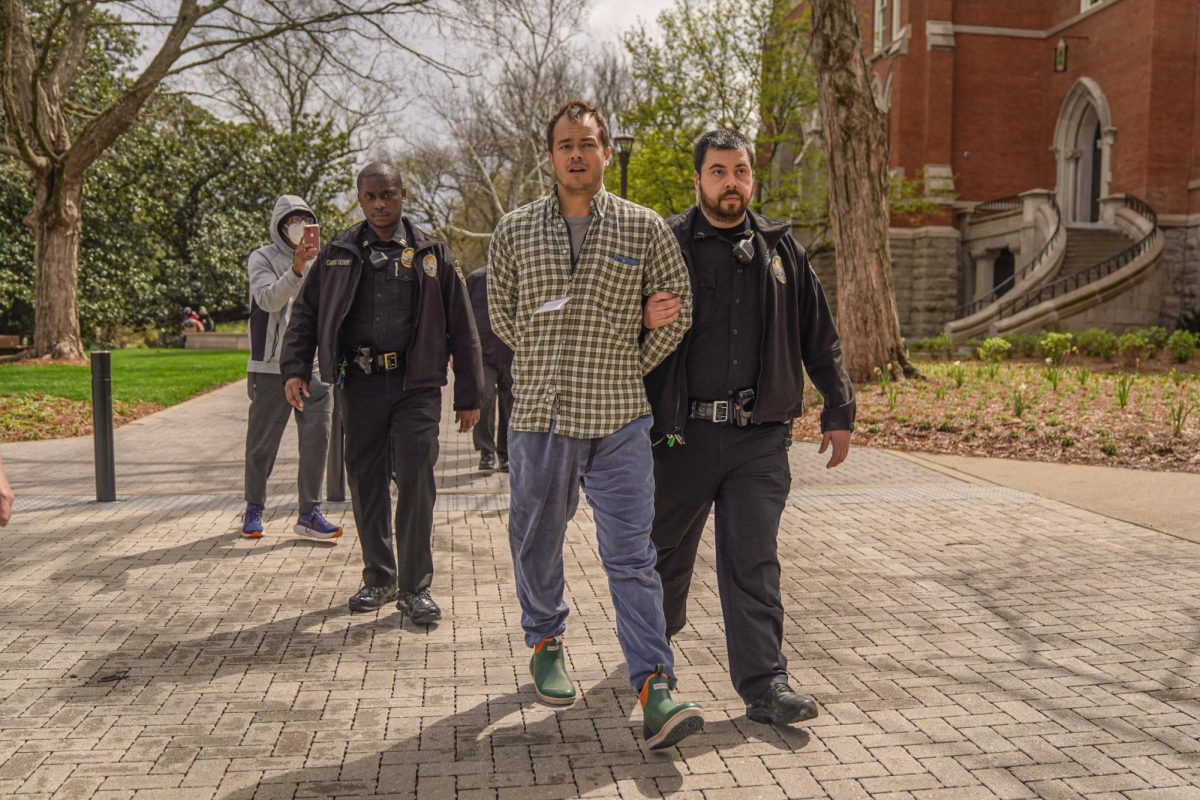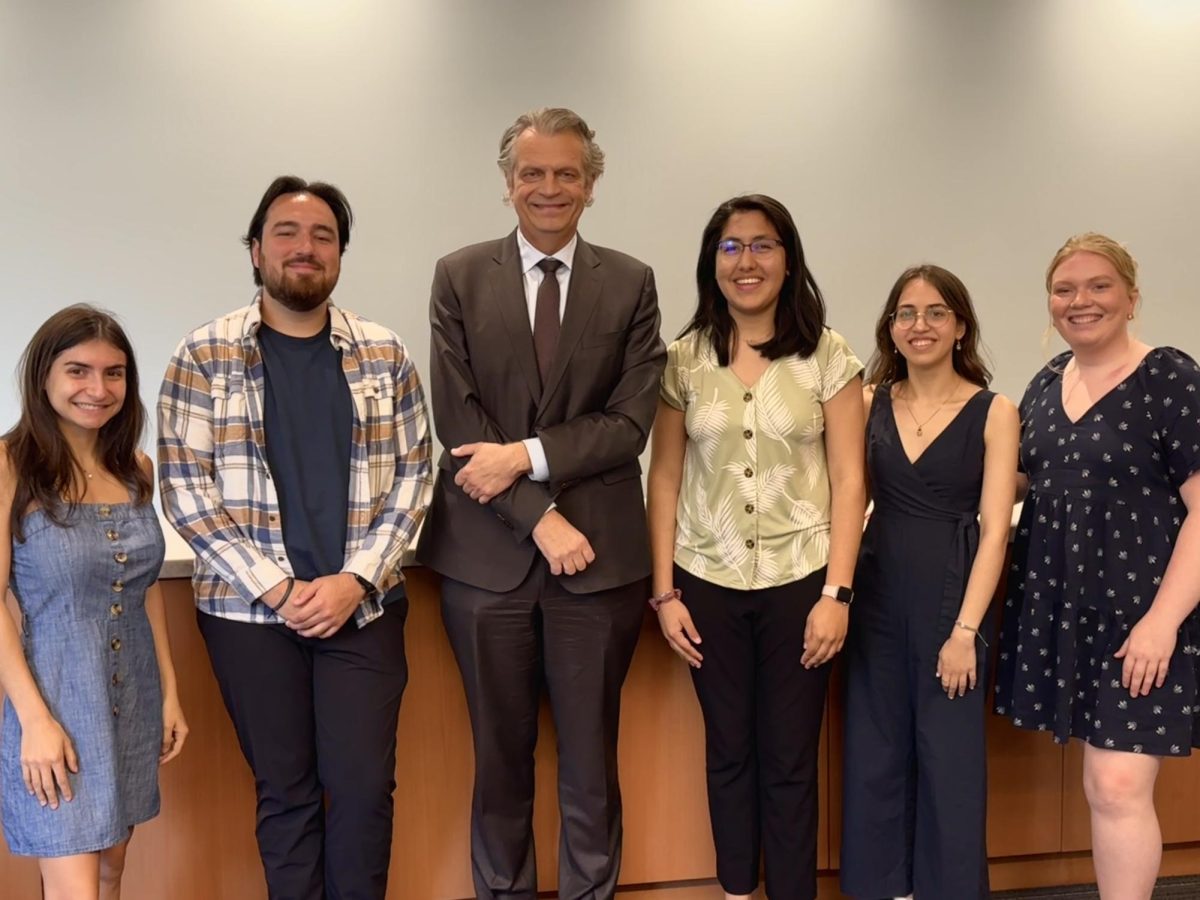The Hustler sat down with Chancellor Daniel Diermeier for our first debrief of the semester. He discussed institutional neutrality in the context of the university’s endowment and explained how neutrality applies to faculty and staff on campus.
He also spoke on the upcoming election, the legacy of Dean K.C. Potter, campus safety and construction, as well as this summer’s international sporting events.
A deep dive into neutrality
The Hustler: How did the university’s commitment to principles of institutional neutrality, free expression and civil discourse influence the recent changes to student handbook policies regarding freedom of expression and use of campus space? Were these changes a direct response to the sit-in, protests and encampment at Kirkland Hall last semester?
Diermeier: These principles of open forum, institutional neutrality and civil discourse have been guiding us for a long, long time. I would say since the late 60s, early 70s. We try to ensure that they are appropriately implemented in the student handbook and within the policies. What we have done with the student handbook changes is that a bunch of things were clarified. We felt the student handbook wasn’t explicit enough, so that’s really what this was all about.
You have written multiple op-eds on the policy of institutional neutrality recently. What is your message to other universities who are now embracing policies of institutional neutrality and to those who are not?
We are seeing the beginning of a movement. The arguments for institutional neutrality are very compelling. The first one is that we don’t want to create a chilling effect — faculty and students should feel free to discuss or debate issues without worrying that they’re violating a party line by the university. Second, if universities constantly take positions and try to settle debates, politicization on campus will be encouraged. The third thing is that it also undermines our commitment to expertise. Institutional neutrality is about putting restraints on the leadership of universities to free up space for faculty and students.
Starting in the last few months, a whole bunch of universities have made a commitment that the presidents will no longer comment on political or social issues. That’s great.
In my view, they’re not going far enough in two ways. Number one is they shouldn’t just apply to the president, but also with respect to schools. For example, the dean of the law school or business school should refrain from making official statements just as much as the president. It is inappropriate to settle a particular issue in the scope of the faculty and the students. And secondly, it’s not just about words. It’s about deeds as well. To say we’re not going to talk about a particular position but then use our endowment to take a position by whether we will divest or not — that’s inconsistent. You have to go all the way if you have a principle of institutional neutrality. It must guide your words and must guide your deeds.
What about existing endowments and existing investments? Is there a policy for reflecting on those among leadership and administration?
Our endowment is managed by the Office of Investments, a group of professional investment managers whose goal is to create maximal returns for the endowment. These endowment returns are used to support the faculty’s research and provide financial aid and other support for students.
The office makes all sorts of decisions and invests in various funds. But their job is to ensure they’re maximizing the returns on the endowment. They are not supposed to take political or social positions in their endowment decisions. They’re not directly investing in stocks — they’re investing in managers that invest in stocks. Our endowment managers may decide to stop investing in Microsoft because they think that Microsoft, for example, spends too much on AI. That’s perfectly fine. They invest or divest from stocks all the time.
What’s not appropriate is for them to say, ‘We’re divesting from Microsoft because we are opposed to the fact that Microsoft is doing business with the Israeli government.’ That would be violating institutional neutrality. Investments and divestments happen all the time, but they’re not happening for political or social reasons.
Do you see politics interfering with what gives the university maximal returns, and is there any method to address that? Or is it strictly about profit?
When looking at returns, you also look at the risk associated with that — legal risk, regulatory risk, all sorts of things. When making investments in foreign countries, you would look at the political risk associated with investing in a particular country. But that’s always in service of being a steward of the endowment. It’s not done because you want to take a foreign policy position. That’s always the lens that we’re taking. We want to do it in a legal fashion that minimizes our risk and our downside. We’re not trying to make a political point by how we manage the endowment, and I think the moment you do that, you’re no longer consistent with institutional neutrality.
Does the university perform reviews on the political bias that might be associated with investments?
It’s not about political bias. It is the principle that when you look at an investment, with what lens did you kind of look at it? The lens we are taking is whether this isn’t from a financial point of view a good investment and whether our team believes it generates returns because the returns are then utilized to support our mission. That’s their job, and that’s their guideline. And then, we review the types of investments that they’re doing as part of the Investment Committee, but they have signed on to these guidelines, and they are guiding the decision making.
You mentioned that department heads and school heads also need to adhere to and practice institutional neutrality. How do you envision this being applied to Vanderbilt’s campus — where do we draw the line? What is the highest leadership position a faculty member can have and still take a stand on an issue?
The question is, ‘Am I speaking for other faculty members?’ Let’s say you’re a dean of the law school, and there is a question of constitutionality of a particular Supreme Court decision, the Dobbs decision, let’s say. Members of the faculty will have different points of view on how the Dobbs decision was decided, and they may write an article in a law review that argues from one side or the other. Our goal is for the faculty to have the broadest possible freedom to explore these issues. If the dean of the law school now says, ‘This case has to be thought about in this way,’ we’re now creating an official position that creates a chilling effect on the individual faculty of the law school. We want to have restraint so that we maximize the freedom for the faculty to explore these issues.
What we don’t want is for people that have an administrative role — where they have control or power over other faculty members, for example, through promotion decisions to research allocation decisions — to take an official position that constrains the ability for the faculty members to do their work. It’s perfectly fine for a whole group of people to agree, but we want them to sign their names individually, not on behalf of an institution.
What about particularly prolific department heads and school heads, especially if they’ve commented, written op-eds or done news interviews in the past and are now taking on the role?
Let’s say you’re the chair of a department. In your role as a scholar, because you’re still a scholar, we’re perfectly comfortable with you taking positions. Let’s say they write an op-ed piece or speak to a journalist; it’s important that, at some point, it’s stated that they speak on their behalf and not on behalf of the department.
That’s usually not a problem. If there is a concern, we’ll have to talk about it and clarify. But this is a good point because many of our faculty have administrative and faculty roles. In the faculty role, we want them to take positions. If you’re law school faculty, you argue for one side in your law review articles, and that’s great. But do not pretend or state that you’re speaking on behalf of an entire institution. That’s the key distinction.
Do you think that has the same effect in practice when department members or faculty members know a person has been commenting and know their position? How do you apply this feasibly?
People have to make this call individually. When they talk to their colleagues, for example, they may have to be clear that ‘I said it in this case, but I’m going to try to be as scrupulously neutral on that so that you should not be worried about that.’ Then, make that a practice in your leadership. Some people may decide that they want to refrain from that whatsoever, and that’s certainly something that I and the provost are trying to do because we have senior roles in this university. We’re extra careful so people don’t unintentionally confuse our personal opinion with the opinion of the university. This is a question of prudence. If you have a senior role, how do you handle that? The critical thing is that [you] distinguish your role from the administrative half, and if there’s a lack of clarity, try to be more clear about it.
Is this policy written out for deans and heads of school to see in writing, or is it more just understood?
I think it’s understood now; it’s clearly stated. If there are questions, we always discuss it. Whether we want to be a little bit more explicit with respect to a policy, I think that’s a good question. At this point, we didn’t see the need for that. But if there is a concrete need for that, it’s definitely something that we can consider.
Would there be repercussions if someone decided not to or if a faculty member said they feel their department head isn’t abiding by institutional neutrality?
We would just have a conversation. I think most of the time, people understand that and the distinction. Those are the principles of how we govern ourselves, and that’s how it would happen.
In another recent op-ed in The Wall Street Journal, you called on scholarly associations to refrain from taking sides, naming the Middle East Studies Association, African Studies Association and Women’s Studies Association. How do you propose such fields avoid politicization when their subject matter(s) are often interconnected and have historically been politicized?
These scholarly associations have a particular purpose: to create forums for people to talk to each other but also to recognize excellence in the field. Many of these professional associations, including the ones that are named in this op-ed, give things like awards for best book or best dissertation. That comes with the claim and the authority that these associations are able to judge that. It is very worrisome if professional associations whose mission it is, among other things, to recognize excellence in the field are now adopting political positions on issues that have nothing to do with their stated mission.
Now, the same question occurs that you would have in a university context: What happens if I disagree with this position? Does that mean I’m not eligible for the book award? Does it mean I’m not a full member of the association? Is there no space for me to argue or issue these types of things? That’s problematic because it restricts freedom for our faculty and creates a chilling conformity effect that we don’t want. We want to make sure that people participate in their research freely, without these constraints, so that’s what they [scholarly associations] should do.
The purpose of scholarly institutions or associations is to support scholarship. If they’ve [taken stances], they should go back to their original purpose and say, ‘Our purpose is to recognize excellence of field or conduct conferences or publish scholarly journals.’ They should stop taking positions on political issues inconsistent with their stated mission. The fact that they have done it historically tells me they shouldn’t have done it — so stop doing it now. Take this moment to reestablish and reaffirm the values that should have guided them.
In response to efforts by graduate students to unionize, the university recently released a website with information to help graduate students make an informed decision about whether or not to join Vanderbilt Graduate Workers United. How does the university taking a stance opposing the unionization of graduate students align with institutional neutrality?
It’s very important to understand that institutional neutrality is really about issues and policies that are not directly connected to the operation of the university. Unionization for graduate students is super core to the operation of the university. Whether you have a graduate student union or not will dramatically and fundamentally alter the relationship between your supervisor and the student because now there’s an intermediate — that’s the union. It is squarely within what we would consider the operations of the university.
Once it’s within the scope of the university, we will always ask ourselves, ‘What’s the best thing to do given the mission of the university?’ One of the core missions of the university is to provide a transformative education for students, and we believe that having graduate student unionization inhibits that mission and that purpose. We don’t think that’s a good thing.
We don’t have a point of view about unionization outside the university. So, if you ask me if we have a point of view on unionization for the retail industry, we have no point of view on that. We have very good relationships with the part of our workforce that’s unionized. The key here is that the relationship with our graduate students is core to the way graduate education is structured. Because it’s crucial for education, we have a point of view, and we make that point of view known — just like we have a point of view on immigration restrictions for doctoral students. That’s a policy issue, too.
The question is always: Is it inside? Is it outside? Does it affect our operations directly? If it does, we not only have the permission but the obligation to have a position on that. But if it is not, then institutional neutrality.
Do you think that, in any case, unionization could have educational value for graduate students?
No, I don’t. The relationship between a doctoral student and a supervisor is enormously important. It’s a relationship of trust, where the supervisor really works closely with a graduate student or doctoral student in an individualized manner. It is not a good idea if there is somebody that comes into this relationship. Now, there are a whole variety of aspects of graduate student life that are important, and we want to make sure that’s done well. Are the stipend levels high enough? Are the benefits good enough? Are there processes if there are grievances so that graduate students can bring them forward?
We have very good processes for that, of course, including student representation for graduate students and a variety of ways these grievances can be brought to our attention. That’s hugely important, but a union does not improve these processes. [Unions have] all sorts of negative consequences with respect to the education that our graduate students will receive. We’re totally committed to giving our graduate students the best possible education and having various different channels so that if there are issues and problems, they can be brought forward. We just don’t think a union is the right mechanism for accomplishing these goals.
Polarization in an election year
What encouragement or advice would you give to students in the semester of a presidential election in the midst of a politically charged and polarized atmosphere on campus and around the country?
This is a highly polarized election. People will feel very strongly about that. They will have strong emotional reactions to that. They will have commitments to one side or the other, or they want to explore things and want to talk about [the election]. The most important thing is to use this election to talk to each other in a way that remembers that we’re members of one community. We can still explore differences. We can do it in a respectful manner that never forgets that we all came here to be members of a living learning community. [Remembering] even with somebody who sees things differently, I can learn a lot, but that entails a commitment to mutual respect, listening to arguments and having discussions based on facts, evidence and reason. As long as we do that, we’re going to be fine.
In the U.S. Elections class on Tuesday, there was a speaker who came to talk and caused some buzz on campus. Do you have any comment on that, and do you see any shift happening in the speakers that are brought into classes after that?
There will be speakers on campus that some of our students vehemently agree and disagree with. And then the question is, what do you do about that?
The first model is to have no speakers on campus whatsoever. There’s always a possibility that that speaker will offend somebody. Model two, which is our model, is that faculty members and registered student groups can bring on to campus every speaker they see fit. That’s a tradition that goes back to the late 60s and early 70s. The third model is that we have a committee who checks every possible speaker that comes on campus.
Our tradition, our history has been number two, and that puts a lot of trust into our students, into our faculty. They can handle the controversy. They don’t have to agree with what was said, but that system brings a variety of voices to campus.
When they’re politicians or they’re advocates for a particular point of view, [speakers] state their point of view on this very forcefully. We may not like that, but we think that that having exposure to this is an important part of an education. We want to make sure that when these events are structured, that there’s possibility for challenge, possibility for debate and for discussion.
You may recall that last academic year, we had we had the Israeli ambassador, and we have a former Prime Minister of the Palestinian Authority in one of our classes. A lot of people had strong points of view. Some agreed, some disagreed with the speakers, but there was great dialogue. There was great debate. That’s what we want.
Having outside speakers, I think, is important because that’s the real world, and interacting with that as part of your college experience is hugely important. We strongly believe that the best way to do this is to give our students and our faculty the right, and with that comes the responsibility to do this properly, and that’s what we’ve been doing.
Student belonging and safety
In reflecting on the recent death of K.C. Potter, how does the university continue to uphold the values of inclusivity and advocating for marginalized voices that Potter championed in his time at Vanderbilt?
K.C. Potter has had a tremendous impact on the lives of so many students and staff members and is a revered member of our community. We honor his legacy now, but we also honor it through the K.C. Potter Center. Our goal is to have students from all backgrounds on campus and then make sure that they are put in an environment they can thrive, no matter their background, sexual orientation, political beliefs, national origin or religious beliefs. That’s what we want, because having a diverse, rich community on campus creates the best learning opportunity. [Potter] did that very forcefully, and I think that’s one of the reasons why he is so revered on campus.
Former Chancellor Joe B. Wyatt didn’t want to include sexual orientation in the university’s non-discrimination policy because he felt the culture hadn’t reached that point of acceptance. In the context of neutrality, how do we prevent the university from lagging behind on issues that might eventually prove relevant and become the common discourse?
We need to constantly reflect on that. Fundamentally, we want to make sure that we are mindful of the barriers to access and then the barriers to thriving. The financial barriers to access we really try to tackle through Opportunity Vanderbilt, but there are also non-financial barriers to access. We are, as an example, co-leading an initiative to make it easier for students from rural communities to come to Vanderbilt, which is called the STARS network, with the University of Chicago.
The second point is, once you are on campus, we need to make sure that that you can reach your full potential. Every student, no matter what their background is, will need something from time to time. I’m a first-generation student, and there are so many first-generation students on campus. They may need some support for what it’s like to be in a university environment. They may need advisory services for that. Students may need religious accommodations. There needs to be education and awareness of our differences, and we need to learn to celebrate that and to understand that having people with differences is enriching for us.
That’s ongoing work—from how we deal with holidays, dietary restrictions and accommodations to how we provide the support that’s needed at a particular point in time. Our job is to be clear about our goals and what we’re trying to accomplish and then be mindful that, in some sense, the work is never finished.
When we look through our history, there were moments when we were exclusionary. We were a segregated university, but we got better. We sometimes took a long time — sometimes took way too long. There was a process in getting better, and that process hasn’t stopped and may never stop, but we’re committed to making sure that we’re providing an environment where every student of any background can thrive.
There have been multiple incidents on campus recently that have caused concern about student safety, including an altercation between external contractors performing maintenance that resulted in a shooting, a gun being found in the backpack of a janitor at the Rec and Rand Dining Hall receiving a 75 on a health inspection. How does the university prioritize student safety, and what steps are being taken to increase student safety going forward?
From what I can tell the health score was higher, and if there are issues, we’ll address that.
We’re totally committed to having a safe learning environment and a safe environment on campus. Whenever we have an issue, we’re right on it and we’ll address it. So when we have potential problems with contractors, for example, we’ll talk to them and make it crystal clear that they need to be consistent with our rules. If they’re not, we can’t work with them.
The second point is we had one incident recently where people just tried to get to the hospital. We have a hospital close by with an emergency room, so I don’t think that was a safety issue per se; it was just upsetting to people, and naturally so. If there are things that are related to our contractors or anything that’s happened on campus, we will be all over that, and we’ll make sure that that’s taken care of. Then, there are certain things where it is the external world. In the case of the hospital, I think it’s more like a question to make sure that we are providing support for our students if they’re affected, even though it’s not a direct safety question.
There was an external contractor review. Do you know if it’s complete, and if it’s going to be released the public?
We are looking, that’s more like a policy question. We’re looking a little bit on what we want to do there. It’s pretty in the weeds about how we do contracting, so we’re still in the process of that. We’re just not done.
Ongoing construction
With the opening of Carmichael College this semester, what is the next big step in terms of residential college construction?
We’re very happy about Carmichael. I think that turned out very well. We love the Carmichael Cafe. I think that’s going well, so I hope that’s something you’re enjoying.
We will do more, and we’re not done with the planning. We haven’t finalized our plans, but our goal is to finalize the residential college system. We’re hard at work. We’re going to continue this process and this commitment.
Are there still plans to tear down Highland Quad?
We looked at Highland Quad as a possible location [for a residential college]. We’re at a point now where it doesn’t look like that’s where it’s going to be. But we’re not finished — Highland Quad is on hold for now.
What is the status of the Senior Commons project?
We are exploring that, too. The question is, ‘What will be the residential experience for our students?’ That question will occupy us for the next few years. These are massive investments and projects.
The experience that we have with our residential colleges is super positive, and the students really respond positively to that. We love the way The Commons is working. I think that’s maybe the best, or among the very best, first year experiences that we have at any residential college.
Our goal is to make sure that we do this for the next four years as well. It needs to be in line with our students’ development and needs so it’s conducive to growth whether you’re a first-year student or when you’re a senior. We’re thinking through exactly what this looks like, and it’s great for us that we have so many residential colleges that are operating because it provides us with more information and data on what’s working and what’s not. For example, we felt that having a cafe is better than having another individual dining hall. So there are adjustments like that.
As a leadership team and as a board, totally committed to making sure we get this right. It’s a pretty involved planning process. And sometimes you realize, when you make progress, that’s not the best solution, and you retrace your steps, and you say, ‘Well, let’s try this instead,’ and that is where we are at this point.
Editor’s mix
Did you watch the Olympics this summer? Did you have a favorite sport to watch?
I really love track and field, and I thought that some of the races were really fantastic. The women’s 400m hurdles was great, the men’s 400m was great. I think the women’s marathon was awesome. I like the classical disciplines that have been there for a long time: swimming, gymnastics, track and field and then, from time to time, you have an opportunity to watch some sports that you know nothing about — like weightlifting, breakdancing or Greco-Roman wrestling.
Did you see the Euros?
I did. Actually, I took my sons, and I saw two games. That was really cool. We saw Portugal against France. We saw the Netherlands against Turkey, which was awesome — the whole thing. That was a great tournament. When you’re in the stadium, that’s a whole other [experience].

